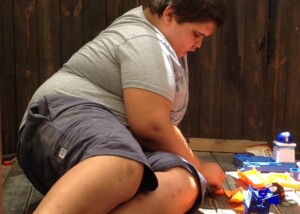It’s unsettling that parents allow their very young children to get fat.
I don’t mean a little plump, but FAT; this is evident at the water areas at the YMCA where I’ve been taking a special needs adult for her Saturday program.
At the YMCA are three water areas: a tide pool where they make tide waves; a smaller area that includes a whirlpool; and a giant slide.
Now, we’ve all seen “chubby” little boys and girls. But it’s a whole new level of shock when you see boys and girls – at single-digit ages – who make the typical chubby child look slender.
Though these fat six-, seven- and eight-year-old children look happy playing in the water, we have to believe that their level of obesity gives them problems on a daily basis – and this isn’t due to what TikTok and Instagram calls “fatphobia.”
It’s due to the reality that a young child’s skeleton is NOT designed to efficiently support a body that’s much heavier than it should be.
In general, they have no difficulty splashing around in the tide, but I actually saw one boy – about six or seven – struggle with running into the water. Dad was overweight, Mom was morbidly obese. I easily imagined an abundant supply of junk food in their home.
There’s a definite difference in the spring of the normal-weight kids and the super heavy kids.
Even the kids who’d be considered only plump or pudgy could definitely move with more ease than the significantly overweight kids.
The Parents Don’t Have to Say Anything
Supporters of the “never put your child on a diet” movement, and those who subscribe to fat activism, will argue that it’d be worse for the child’s mental health if the parents took measures to reduce their weight.
Many of these proponents of “acceptance of all body sizes” were subjected to mental abuse by parents or other family members about their size when growing up.
Due to this ingraining of emotional abuse during their formative years, these adults can’t imagine there’s a way to cultivate weight loss in an overweight child without inflicting mental harm on them.
But there is! It’s the say nothing approach.
A child whose age is in the single digits is entirely dependent on their parents for food access.
Certainly, when these kids go to a birthday party or friend’s house, the parent isn’t there to monitor the food intake.
And that’s okay, because the occasional birthday party, slumber party or play date food access isn’t going to maintain obesity.
It’s the everyday food intake that keeps these young children fat.
- It’s not Jennie’s birthday party; it’s what Mama packs in their school lunch.
- It’s not the ice cream at a neighbor’s house; it’s how much Mum serves them for dinner.
- It’s not the candy bar that Nana slips to the youngster; it’s the ample supply of junk food in the house the child lives in.
To foster weight loss in a fat child, the parent need only limit food access. They don’t have to say a word.
No shaming is required; no humiliation tactics or insults are necessary; simply stop overfeeding the child. This can be accomplished as follows.
Food Supply at the Dinner Table
Instead of putting a giant bowl of mashed potatoes on the table, which entices kids to self-serve multiple heapfuls onto their plate, bring out only enough for one serving for each person.
This can be accomplished even if Dad, who’s thin, wants two servings.
Mama could simply put a one-and-only helping on the child’s plate – and that’s it.
This way, there’s no more mashed potatoes to be seen, other than what’s on other plates. No big bowl sitting on the table, beckoning the child to eat more.
Same with other foods: Bring out only enough for a single serving. “Out of sight, out of mind,” really applies here.
If that fat little girl or boy doesn’t see a plate of extra pork chops, they’ll be less likely to want more.
Don’t bring out a plate with a dozen brownies on it when there’s only four family members.
Instead, give each family member one brownie. The rest are in the freezer for another day.
Snack Access Throughout the Day and Night
Keep the junk food locked up. Nobody’s saying you must totally give up ultra-processed junk foods.
To completely abandon them would be unrealistic.
But just as you might be keeping the liquor locked up, keep the high calorie, unhealthy snack foods locked up so that your very overweight child can’t get to them.
This isn’t cruel. IT’S LOVE.
This isn’t cruel. IT’S LOVE.
Give them a single serving of a junk food snack only occasionally. That’s the rule. It’s not negotiable.
They may sneak junk food at a classmate’s home, but remember, this limited access isn’t what’s keeping their bodies obese. It’s their typical daily menu from their primary caretakers.
Keep plenty of lower calorie, healthful foods on hand for snacking.
Remember, if a child isn’t hungry enough for an apple, grapes, raisins, plain yogurt or unbuttered popcorn, then they’re not hungry enough for ice cream, tortilla chips, handfuls of cheese crackers, candy or cookies.
“That’s Enough”
Saying “that’s enough” is not mental abuse. In fact, “You’ve had enough” or “You get only one serving” is far from shaming.
People who believe it’s cruel to put a fat child on a diet likely heard all sorts of denigrating remarks when growing up – comments that left deep scars and have warped their ability to navigate a healthy lifestyle for themselves – and their kids.
Little kids don’t have money and can’t hop into a car and drive to McDonald’s or Pizza Hut.
- Their main food source is whoever is taking care of them.
- And it’s the main food source that’s making them fat.
Parents need to put their foot down and stop allowing their kids “food freedom.”
A fat child may be bouncy and active at age eight, but don’t think for a single moment that this spryness will last well into adulthood.
A young body can have plenty of energy despite carrying significant overweight.
But the wonders of youth don’t last long when a child is obese. It WILL catch up to them sooner than the parents could ever imagine.
Overconsumption Is NOT a Medical Condition
Taking your fat child to one doctor after another to find out “what’s wrong” has never been proven to be effective for weight loss.
What’s “wrong” is that the child is overconsuming food. It really is that simple.
Only in very rare cases does a fat child have a medical condition that puts them at risk for obesity, such as the genetic Prader-Willi syndrome.
It’s Deplorable
The childhood obesity epidemic in America is deplorable. It’s a crying shame there are so many really fat little girls and boys all over the place.
Obesity has even been shown to cause harm to a child’s brain.
A research article (JAMA Pediatrics, 2020, Laurent et al) explains that higher body mass index (BMI) in kids nine to 11 was associated with thinner cortical regions — especially in parts of the prefrontal cortex tied to executive functioning and impulse control.
Another study (Translational Psychiatry, 2022, Dennis et al) reported that kids with elevated BMI and from lower socioeconomic backgrounds showed structural brain deficits including reduced cortical volumes and reduced white matter integrity, along with diminished cognitive flexibility and attention.
These types of studies aren’t isolated. There’s a load of them – and every parent of an obese child should read the study summaries for a good shakeup.
No child has to be fat. No parent should allow this travesty.
![]()










































